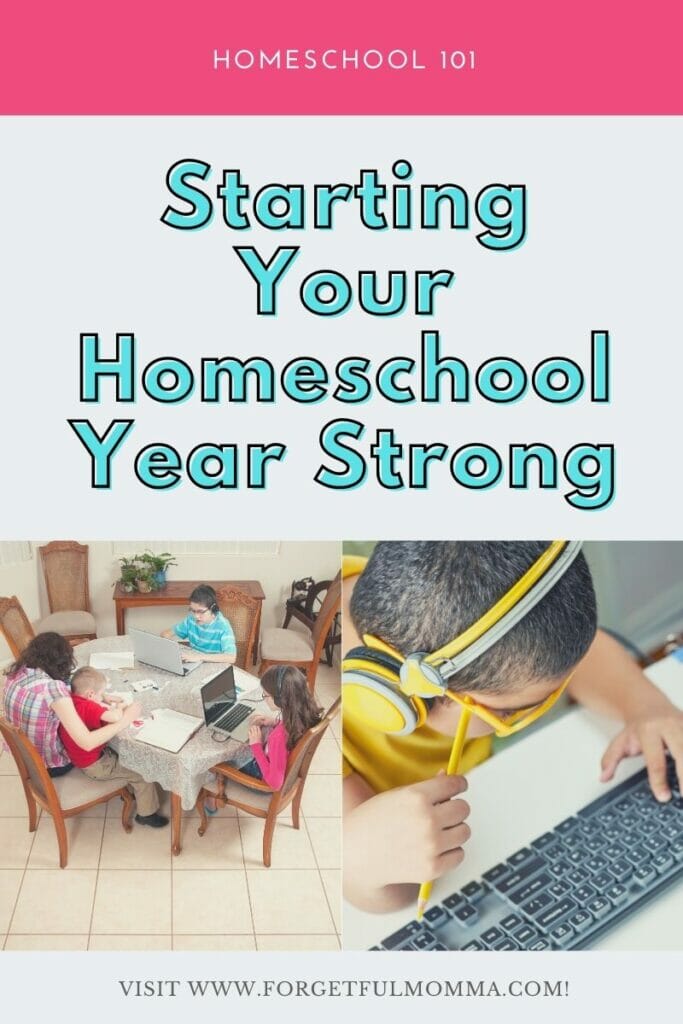The start of the school year is all about a fresh start. You get to start your homeschool year strong and let go of any feelings or curriculum that were holding you back from your best year. Let’s make sure we start this year off right with these four tips.

This post contains affiliate links, see my disclosure policy for more information.
Starting Your Homeschool Year Strong
One subject at a time.
Don’t plan to do every single subject on day one…or maybe even week one. That is a recipe for disaster.
I know you’ve made your lesson plans and you’re excited to dive right in, but take it easy! My daughter is in middle school and we still introduce a couple of subjects each week over the first few weeks. It is much less stressful on all of us than trying to do everything from day one.
Don’t expect perfection.
Your children won’t remember everything they learned last year, and that is okay. Allow time for review and discussion. Expect mistakes. We learn by making mistakes and reviewing our errors.
Don’t nag.
This was my biggest issue on our not-so-good first days of school.
I spent the majority of the day playing Momma Drill Sergent. Getting back into the school routine takes time and adjusting. Nagging and expecting 100% compliance from the first day only creates frustration. Spare yourself and your children this unnecessary evil. You’ll be glad you did!
Don’t make it just another school day. Have fun! Celebrate. Make it a special day. The idea is to make your children excited about the new school year, not to fill them with dread. {Keep reading for some fun ideas!}

Don’t allow your lesson plans to run YOU.
Lesson plans are a guide. They aren’t meant to be written in stone. Throw your schedule out the window if you need to.
If you spend all day on a science experiment and totally neglect math for the day. That’s okay. Sometimes our best-laid lesson plans become thwarted by fun.
Sometimes character development takes precedence over History. This my friends is the beauty of homeschooling. Start strong from day one.
Choosing A Homeschooling Method that Works for You
If this changes as you go through your year, or even your whole journey of homeschooling, that is natural. It is the natural progression for things to change and evolve and your homeschool is no different.
There are a number of different methods of homeschooling:
- Classical education is rooted in antiquity. Schools taught using the classical method until the early part of the 20th century.
- Traditional education uses a set curriculum that usually incorporates workbooks, spiral lessons, tests, and quizzes.
- The Charlotte Mason approach was founded by the British educator Charlotte Mason. Mason trained as a classical educator but realized the classical education methods in her time were sometimes too rigorous and monotonous.
- give children a broad exposure to inspiring and exciting educational books (called living books) instead of dry textbooks
- use nature as a teacher
- Eclectic method is joining different parts of homeschool methods together. Do you love the Charlotte Mason method? Do you like some aspects of the classical approach? Join them together, and you have an eclectic homeschool method.
- The unit study homeschool method is all about connectedness. In traditional education, all the subjects are separated into their own fields. Unit Study topics incorporate all the different subjects together.
- The Montessori homeschool method is self-directed, hands-on learning and collaborative play. Educators aim to develop an individual child’s strengths and interests.
- Waldorf education has grown in popularity in the last few decades. Rudolf Steiner’s education theory emphasizes educating a child holistically; mind, body, and soul.
- Unschooling is education through daily experiences. It is one of the best ways to promote interest-based education in your homeschool! Unschooling students don’t use textbooks or a set curriculum (although they might for a period if they wanted to learn a skill).

Create a Misson Statement
Why are you doing this? What is your reason for homeschooling?
My reason started with “I saw the village and I didn’t want it raising my kids.” There was more to it, but that was the main thing where we were living when we started. Now, it’s because it’s what is best for our kids.
An example could be:
“To educate my children to enable them to reach and expand their potential, and to prepare them to become productive, responsible, ethical, creative, and compassionate members of society.”
That was a lot of information, right? Take a breath. Because you are the best teacher for your child even if you lose it one day and yell at your kid for not doing their math all day. Apologize and move on. We’re all human.
More Homeschool Related
Homeschooling Budget: Back to School Sales
